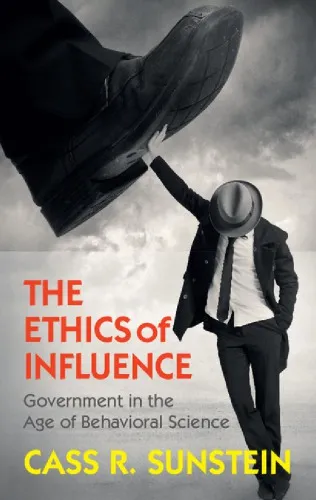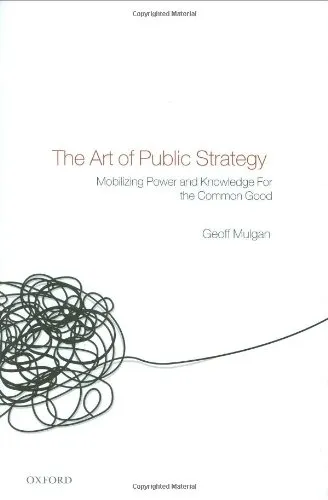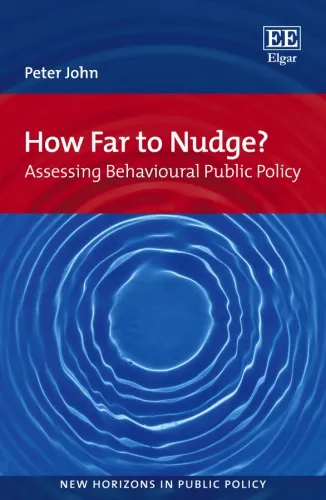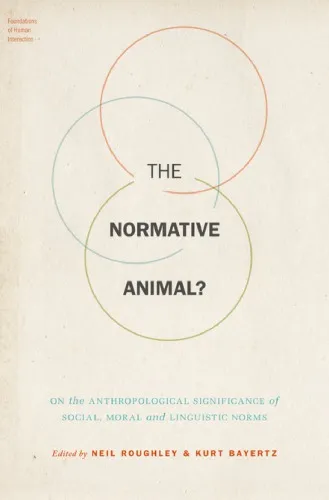The Ethics of Influence: Government in the Age of Behavioral Science
4.0
Reviews from our users

You Can Ask your questions from this book's AI after Login
Each download or ask from book AI costs 2 points. To earn more free points, please visit the Points Guide Page and complete some valuable actions.Related Refrences:
Welcome to the world of behavioral sciences and their profound impact on modern governance. "The Ethics of Influence: Government in the Age of Behavioral Science", authored by Cass R. Sunstein, offers a deep dive into the ethical implications of governments utilizing behavioral science to shape human behavior. This introduction provides a detailed overview of the book and explores its significance in today's socio-political landscape.
Detailed Summary of the Book
In this compelling work, Cass R. Sunstein examines how governments around the world have increasingly adopted insights from behavioral science—drawing on concepts like "nudging"—to guide citizens' decisions without resorting to coercion or heavy-handed regulations. At the heart of this paradigm lies an understanding of human psychology: we are not always rational actors. Instead, cognitive biases, heuristics, and contextual influences play a significant role in our decision-making processes.
The book meticulously explores the ethical dimensions of these "nudges." When governments intervene to encourage certain choices, how far is too far? Can they strike a balance between respecting personal autonomy and promoting collective well-being? Sunstein introduces readers to the concept of "libertarian paternalism," which advocates for policies that nudge people toward beneficial decisions while preserving freedom of choice. He emphasizes that nudges should be transparent, easily avoidable, and welfare-enhancing—always designed with the intentions and interests of the people in mind.
Through numerous examples, the book delves into how nudging has been applied in areas such as public health, financial decision-making, climate change, and education. From reformatting default options in retirement savings plans to steering people toward healthier food choices through subtle design changes in cafeterias, Sunstein provides a rich array of case studies. The book also discusses criticisms of nudging, addressing concerns about manipulation, transparency, and the role of democratic values in policy design.
Key Takeaways
- The use of nudging brings behavioral science into the realm of good governance, aiming to improve decision-making outcomes without limiting personal freedom.
- "Libertarian paternalism" provides a middle ground between command-and-control regulation and free-market absolutism by ensuring that policies are both beneficial and non-coercive.
- Nudges are most effective when they are evidence-based, transparent, and respectful of individual autonomy.
- Ethics play a central role in the design and implementation of nudges, emphasizing values such as fairness, transparency, and openness to public scrutiny.
- The application of nudging in policymaking raises critical questions about governmental authority, citizens' rights, and the balance between influence and manipulation.
Famous Quotes from the Book
"A nudge is any aspect of the choice architecture that alters people's behavior in a predictable way without forbidding any options or significantly changing their economic incentives."
"The power of nudges rests in their ability to respect freedom of choice while also helping people live healthier, happier, and more fulfilling lives."
"Ethically, nudging requires us to focus on transparency and fidelity to the welfare of those whose behavior we are attempting to influence."
Why This Book Matters
The importance of "The Ethics of Influence" cannot be overstated, particularly as behavioral science becomes an increasingly central tool in public policy. In an era where governments face complex challenges such as climate change, obesity epidemics, and financial insecurity, conventional approaches to regulation are often insufficient. This book serves as a critical guide for policymakers, practitioners, and citizens seeking to understand how soft interventions can improve societal outcomes while respecting personal freedoms.
Moreover, the book pushes readers to confront difficult philosophical and moral questions regarding the nature of influence and consent. As the prevalence of nudging grows in technological arenas—through algorithms, personalization, and artificial intelligence—Sunstein’s insights offer a necessary ethical framework to ensure these tools are used responsibly.
By focusing on both the promise and the pitfalls of behavioral science, Cass R. Sunstein equips readers with the tools to critically evaluate government interventions and their ethical implications. Whether you are a policymaker, scholar, or citizen, this book will challenge and inspire you to think differently about the role of influence in human decision-making.
Free Direct Download
You Can Download this book after Login
Accessing books through legal platforms and public libraries not only supports the rights of authors and publishers but also contributes to the sustainability of reading culture. Before downloading, please take a moment to consider these options.
Find this book on other platforms:
WorldCat helps you find books in libraries worldwide.
See ratings, reviews, and discussions on Goodreads.
Find and buy rare or used books on AbeBooks.
1281
بازدید4.0
امتیاز0
نظر98%
رضایتReviews:
4.0
Based on 0 users review
Questions & Answers
Ask questions about this book or help others by answering
No questions yet. Be the first to ask!













